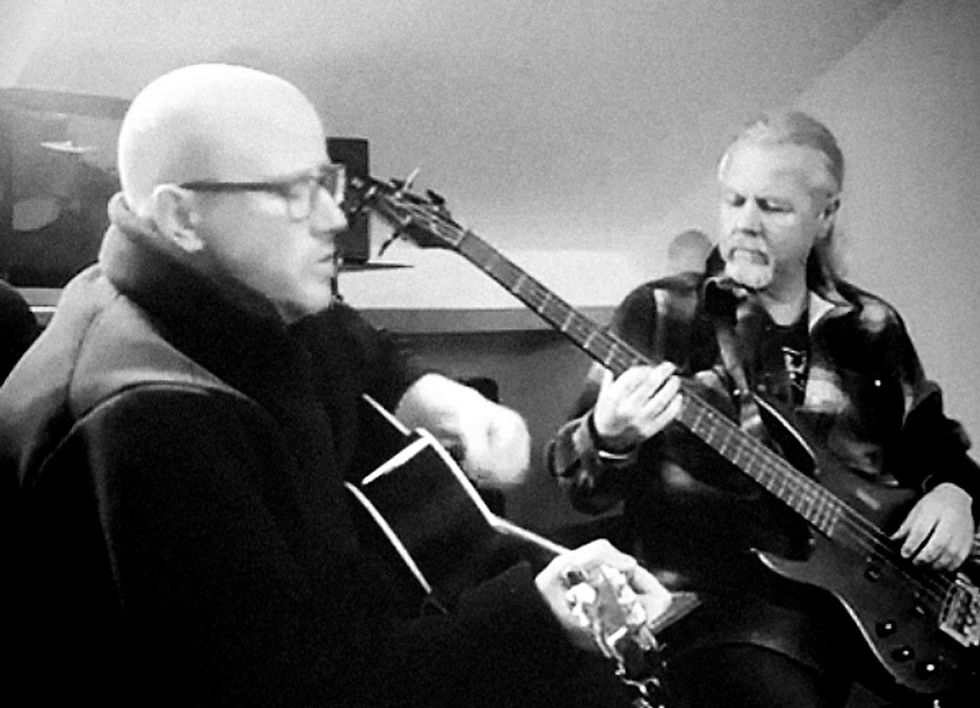Talking about the art of dialogue
- Dr David McKinstry

- Aug 1, 2025
- 7 min read

IN 1991 the sensation that was The Commitments arrived in our cinemas and on our bookshelves. The soundtrack of the movie was a number one album and sold in its millions internationally. It tells the riotous story of a group of young working-class Dubliners, led by Jimmy Rabbitte Jr, who form a soul band and their escapades as they begin to play the city’s music scene.
The film and book—which is part of The Barrytown Trilogy—were met with commercial success and critical acclaim. However, what is less known is that at the height of the book and movie’s success, its author, Roddy Doyle (above), was still working as an English teacher in Dublin. Also, when the book first went to print in 1987, it was self-published because it was rejected by most of the major publishing houses. Moreover, on its release it was not well received by the Irish music press. Yet despite early setbacks, Doyle persevered and has become one of those rare literary breeds—a writer with massive commercial success and critical acclaim.
Early Dublin days
Roddy Doyle was born on May 8, 1958, in Dublin. There was a certain amount of inevitability that he would become a writer; literature was in the family’s cultural DNA. His mother, Ita, was the first cousin of the highly regarded Irish-American writer Maeve Brennan. Although, less well-known in Europe, Brennan was famous Stateside for being a well-connected socialite and as a highly regarded short story writer for The New Yorker. The young Roddy grew up in bookish middle-class family who encouraged him to study English at University College Dublin. After graduating in the early 1980s, he worked as an English schoolteacher whilst pursuing his passion to become a full-time writer.
History is personal
It was during his teaching career that he met his future wife, Belinda Moller. Her own literary ancestry would further strengthen Doyle’s determination to become a writer. Moller came from the one of the most literary and politically prestigious families in Ireland. Her great-grandfather was the internationally famous writer Erskine Childers. Childers—the author of Riddle in Sands—who during the early 20th century was ranked with Rudyard Kipling in terms of prestige and book sales.
Although born in London and from a privileged background, Childers played a pivotal role in the War of Independence. During the truce and treaty period, Childers was publicly and fervently anti-treaty. He was subsequently to become the most high-profile Nationalist to executed by the pro-treaty forces during the Irish Civil War.
Ironically, Childers was tried for the possession of a revolver, which was gifted to him by Michael Collins. Many saw his firing squad execution in November 1922, as the ultimate betrayal of a man who had given his life to Ireland. If that was not enough public history for one family, her grandfather—also named Erskine Childers and a writer—became the fourth President of Ireland. Moller’s family history would be a creative driver for her husband’s historical novels.
History as creativity
Doyle’s wife’s family history and Ireland’s struggle for independence are explored in his book his 1999 book A Star Called Henry—book one of The Last Round-Up Trilogy. The novel recounts the adventures of young Henry Smart, who is recruited by Michael Collins to train volunteers to fight in the Tan War. This Irish history trilogy displays Doyle unique ability to employ a character portrait of Henry Smart as means to exploring the wider landscape of national turmoil in Ireland in the early 20th century.
The Barrytown Trilogy
The Commitments is the first book in The Barrytown Trilogy. The trilogy follows the colourful lives of the Rabbitte family. Book two, The Snapper (1990), focuses on Jimmy’s sister Sharon who becomes pregnant and is determined to keep her baby, but refuses to identify who the father is. Book three, The Van (1990), tells the tale of the father Jimmy Snr, who is made redundant and buys a fish and chip van to make ends meet. The Van was short-listed for the 1991 Booker Prize.
The books’ stories are dialogue driven, which lend themselves to being cinematic, with all three of trilogy becoming successful films. However, their commercial success and riotous tales that drive the books, do not diminish their serious subject matters. The Commitments, focuses on youth unemployment and identity; The Snapper, teenage pregnancy and single parenthood; The Van, unemployed middle-aged men and their sense of personal and family worth.
The Barrytown Trilogy gives a voice to working class Dubliners and their personal concerns, whilst raising larger issues affecting Irish society including teenage pregnancy and unemployment. Moreover, Doyle’s use of the working-class Dublin dialogue was a conscious literary technique to express the lives led by ordinary Dubliners. In his writing Doyle is continuing in tradition of cultural Nationalists going back to Lady Gregory: the Irish tongue would not only be spoken but publicly heard in national life.
Booker Prize
In the early 1990s, whilst most audiences were roaring with laughter at Doyle’s dialogue, the critics were also quietly applauding. In 1993 the Dubliner was awarded the Booker Prize for his coming-of-age novel Paddy Clark, Ha Ha Ha. Set in 1968, the novel tells the story of ten-year-old Paddy who lives in the fictional North Dublin community of Barrytown. Paddy narrates a year in his life, as he transitions from carefree prankster to man of the house, as his parent’s marriage disintegrates under the strain of alcoholism and domestic abuse.
The book demonstrates Doyle’s literary range. He employs Dublin slang and stream of consciousness writing to depict the everyday experiences of a child growing up in Ireland in the1960s. Paddy Clark is a masterwork of Doyle using Dublin humour and the character’s personal odyssey to shine a light on wider issues of domestic abuse and alcoholism affecting Ireland both then and now.
Irishwomen
The success of The Commitments in the early 1990s, afforded Doyle to the financial security to give up teaching and devote himself to full-time writing. Moreover, because his books were bankable film successes, the Dubliner was able to have more artistic leeway to explore serious issues affecting Ireland.
This was seen in his 1996 novel The Woman Who Walked Into Doors. It is the story of Paula Spencer, a woman who is subjected to domestic abuse from her increasingly violent husband. Paula employs the classic battered wife cover story to hide her spouse’s behaviour with the excuse: ‘I walked into a door’ to explain her injuries. Whilst the medical authorities see what is happening to her, they, nevertheless, turn a blind eye to her plight. In desperation Paula seeks solace in alcoholism.
Doyle’s novel about domestic abuse would not be a one off. He would return to her story in Paula Spencer (2006) and The Woman Behind the Door (2024), where he picks up Paula’s story as a widowed and damaged survivor. Doyle—like his fellow literary compatriot—Edna O’Brien, uses Irish humour to make stark social commentaries on wider issues impacting women in Ireland.
Teaching
Like most teachers, Doyle can’t help himself when it comes to educating young people. In 2009, the Dubliner was instrumental in establishment of the creative writing centre Fighting Talk in his home city. The original focus of the centre was to give a space to young working-class Dubliners to explore their creativity. From its Dublin beginnings it has grown into an All-Ireland organisation catering for all the arts in schools and community hubs across the nation. Doyle, like WB Yeats the co-founder of the Abbey Theatre, understands that the lifeblood of Erin’s creative tradition requires innovative spaces to nurture contemporary talent.
Two pints at the Abbey
The prolific writing and sheer energy of Doyle does not seem to be waning. He has turned his online two-minute dialogues Two Pints into a two-act stage play which premiered at the Abbey Theatre in 2017 and is currently touring internationally. The piece is set in a Dublin pub over three nights. The two main characters, originally played by Liam Carney and Lorcan Cranitch, are a pair of middle-aged pals who meet regularly for a pint. Both men are so familiar that they never greet each other and, although their jokes are hilarious, neither seem to laugh.
Their conversations go off in tangents from Nigella Lawson’s appeal to middle-aged men, to hospital car-parking attendants. Through the meandering pub dialogue, it is gradually revealed that Carney’s father is dying in hospital. For three nights, the characters, through grief-stricken humour, begin to explore the meaning of existence. The piece has been so successful that it has toured across Ireland. To add authenticity Doyle has chosen to stage the play in pubs rather than in theatres. This allowed audiences to witness the characters in their authentic setting.
The brilliance of Two Pints lies in the use of dialogue to blend personal and universal themes. Like all Doyle’s comedy, with every joke there is also a serious observation. In this play in particular, Doyle is paying homage to one of his literary heroes, the existential genius Sam Beckett. And as Beckett might say: “Yes, the Irish are seriously funny.”
Dynamic Doyle
Roddy Doyle is still working and living in Dublin and there seems to be no let-up in his relentless productivity. He has written eleven novels to date. His work has seen him win numerous international prizes, including the French Literary Award for The Snapper in 2011. Complementing his international success is his recognition at home, The Guts won the Irish Book Awards Novel of the Year in 2013. In a 40-year career, Doyle has introduced the world to the unique way that Irish voices express intimate feelings and universal themes. What keeps him going? Maybe, Samuel Beckett expressed it best: “The dialogue.”
Dr David McKinstry is a teacher and poet whose poems are widely published and broadcast across Ireland and in the UK. If any readers wish to share their literary output with him, they can contact him at: davmick38h@yahoo.co.uk







Comments